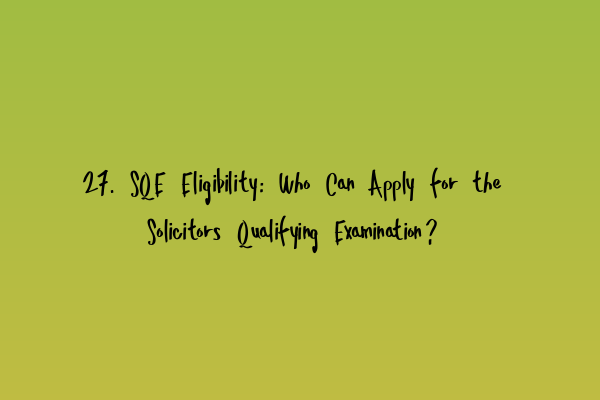27. SQE Eligibility: Who Can Apply for the Solicitors Qualifying Examination?
The Solicitors Qualifying Examination (SQE) has revolutionized the pathway to becoming a solicitor in England and Wales. Whether you are a law graduate or a non-law graduate, the SQE provides an opportunity for individuals from diverse backgrounds to qualify as solicitors. In this article, we will explore the eligibility criteria for the SQE and shed light on who can apply for this prestigious examination.
Law Graduates: The Traditional Route
Law graduates have traditionally followed the LPC (Legal Practice Course) route to become qualified solicitors. However, with the introduction of the SQE, law graduates now have a new pathway to qualification. Law graduates who have completed a qualifying law degree (QLD) or Graduate Diploma in Law (GDL) are eligible to sit for the SQE. This means that whether you have studied law for three years or have converted to law through a one-year GDL course, you can apply for the SQE and pursue a career as a solicitor.
For law graduates, the SQE offers a fresh and innovative approach to legal education and assessment. It focuses on testing practical skills and knowledge that are essential for solicitors in real-life scenarios. The SQE ensures that law graduates are well-prepared for the challenges of legal practice, making it a promising route for those seeking to embark on a successful career in the legal profession.
For more insights on how to ace the SQE and develop proven tactics for success, check out our related article on SQE Strategies: Proven Tactics to Ace the Solicitors Qualifying Examination.
Non-Law Graduates: A New Open Door
One of the greatest advantages of the SQE is its inclusivity. Non-law graduates who have not followed the traditional LPC route to qualification can now apply for the SQE and become solicitors. This opens up a plethora of opportunities for individuals who possess knowledge and skills in other disciplines but aspire to work in the legal field.
Non-law graduates need to demonstrate that they have achieved a degree (in any subject) at a minimum of a 2:2 classification or equivalent. Additionally, they must complete either a QLD or a GDL before being eligible to sit for the SQE. This ensures that non-law graduates have a solid foundation of legal knowledge before appearing for the examination.
Through the SQE, non-law graduates can bring their unique perspectives and expertise to the legal profession. Their diverse backgrounds and experiences contribute to a richer and more dynamic legal community.
For non-law graduates looking to apply their knowledge in real-life scenarios, our related article on SQE Case Studies: Applying Knowledge in Real-Life Scenarios provides valuable insights and guidance.
Eligibility for Overseas Lawyers
Overseas lawyers who wish to qualify as solicitors in England and Wales can also take advantage of the SQE. The eligibility criteria for overseas lawyers is slightly different from that of law and non-law graduates.
To be eligible for the SQE, overseas lawyers must provide evidence of their legal qualifications and experience. This may include their original degree certificates, transcripts, and proof of legal practice in their home jurisdiction. The Solicitors Regulation Authority (SRA) will assess the eligibility of each individual on a case-by-case basis.
It is important for overseas lawyers to familiarize themselves with the specific requirements and processes involved in the SQE application. Seeking guidance from an experienced solicitor or an expert in SQE preparation can greatly assist in navigating the application process successfully.
If you are an overseas lawyer embarking on the SQE journey, our article on Solicitors Qualifying Examination (SQE): Your Gateway to Legal Practice provides valuable insights and tips to help you succeed.
Conclusion
The Solicitors Qualifying Examination (SQE) offers a fresh, inclusive, and innovative pathway to becoming a solicitor. Whether you are a law graduate, non-law graduate, or an overseas lawyer, the SQE provides an opportunity for individuals from various backgrounds to qualify as solicitors in England and Wales. This allows for a more diverse and dynamic legal profession, enriching the legal community with unique perspectives and expertise.
As you prepare for the SQE, it is crucial to develop efficient time management strategies for exam success. Our related article on Mastering Time Management in SQE: Strategies for Efficient Exam Completion offers valuable insights and techniques to help you maximize your productivity during the examination.
Additionally, analyzing your mock exam results can help you identify areas of improvement and enhance your performance. Our article on Analyzing Mock Results for SQE: Identifying Areas of Improvement provides guidance on how to make the most of your mock exams in preparation for the SQE.
Remember, the SQE is the gateway to your legal practice. By understanding the eligibility criteria and utilizing effective preparation strategies, you can set yourself on the path to a successful career as a qualified solicitor.
